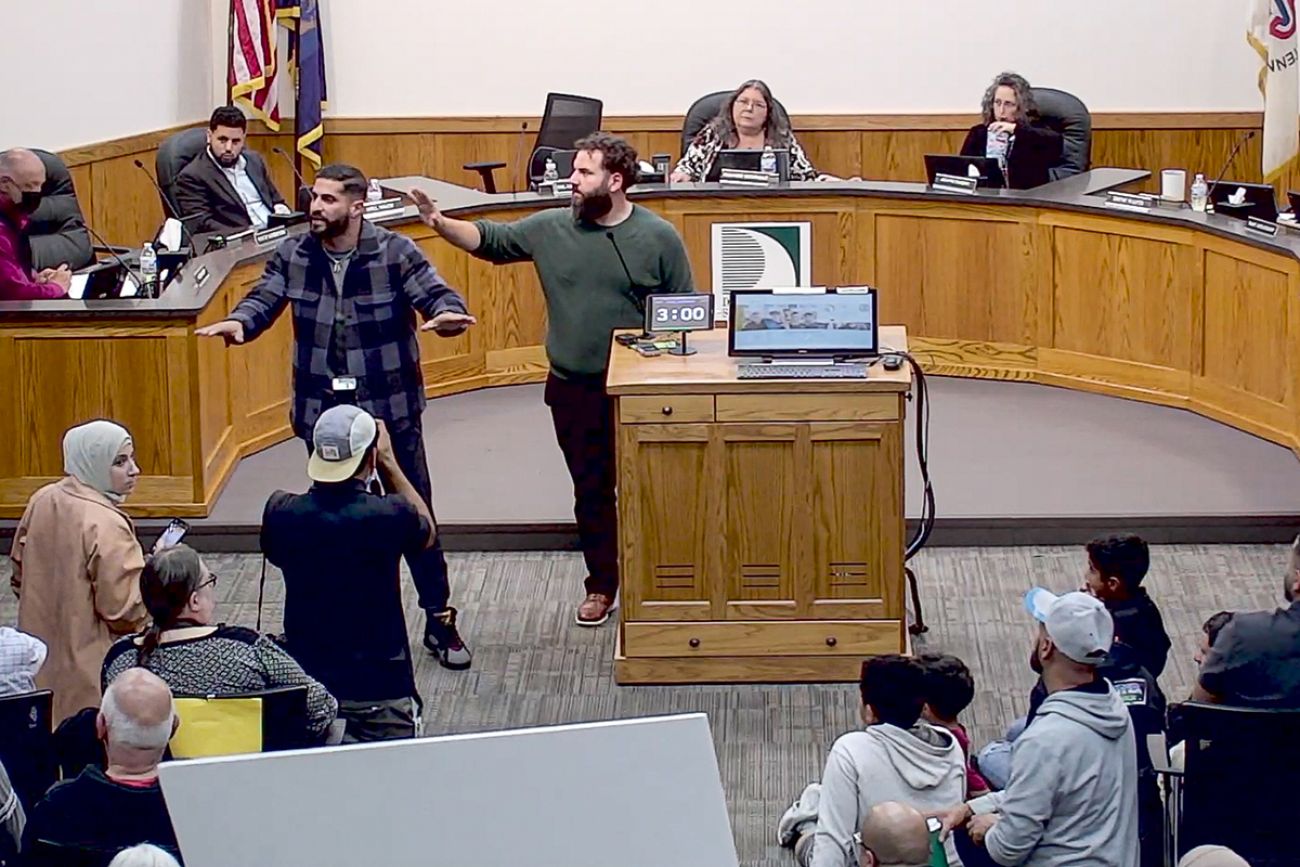As mask battles fade, Michigan school boards face new culture-war debates

- Local school boards are growing more contentious over such issues as LGBTQ books and history curriculum
- Some sitting board members are walking away, saying say joined to improve student learning, not mediate ideological disputes
- Parents’ groups counter that they have legitimate concerns about what books and lessons are being taught to their children
Two years ago, while COVID was raging through Michigan, so were battles at local school board meetings. Across the state, volunteer board members who typically spent their time poring over budgets and contracts struggled to contend with a vocal public sharply divided over mask mandates and online learning.
Those particular battles have subsided, but the political passions they ignited haven’t.
On the contrary, many groups that rallied community support around defending or fighting COVID health precautions are now gearing up to engage local school boards on a broader range of contentious issues, such as history curriculum, book bans and the rights of transgender students.
Related:
- Michigan school districts are flush with cash, but wary of a downturn
- Who is running for the Michigan State Board of Education?
- Parental rights loom large in Michigan election, from governor race to schools
Just Monday, the Dearborn fire marshal shut down a school board meeting after hundreds of protesters showed up to demonstrate against books with LGBTQ-themes. The meeting devolved into chaos and was adjourned before members could get through an agenda that included approving contracts for classroom projectors, adult education services, new hires, high school security guards and asbestos removal.
The board is scheduled to reconvene on Thursday at Fordson High School, which can accommodate a larger crowd.
With midterm elections weeks away, some experts are worried that Michigan school boards could become paralyzed if they again become stages for ideological politics. That concern is countered by parents who say they have legitimate concerns about the transparency of assigned books and school curricula approved by districts.
Already, these contests are attracting a new, more activist wave of candidates pledging to govern school districts in the name of parents’ rights. They’ve found a champion in GOP gubernatorial candidate Tudor Dixon, a conservative TV commentator who has put cultural issues at the center of her education agenda. They’ve been met, in turn, by slates of activist candidates on the progressive side.
Meanwhile, some board members are walking away from their positions or choosing not to run for reelection, saying they’re frustrated by political disputes diverting them from the job they thought they signed up for: helping children learn.
That job has become significantly more urgent. After two years of disruptions due to the pandemic, school boards must contend with falling test scores, student mental-health issues, teacher burnout and the task of allocating billions of dollars of relief money from the federal government to deal with those problems. Officials say protracted gridlock over social issues could make it harder for them to address the urgent challenges facing Michigan’s 1.4 million public schoolchildren.
Don Wotruba, executive director of the Michigan Association of School Boards, warns that an “arms race” between progressives and conservatives in school board elections would mean “nothing gets done.”
“When we have agenda-focused individuals, it does disrupt the progress of the school board, because they spend an inordinate amount of time” on issues unrelated to student achievement, Wotruba said. “While they’re doing that, it’s not a productive, high-functioning school board.”
PAC endorses candidates for ‘parental choice’
Where some see the potential for gridlock, others see a mark of democratic vitality in Michigan.
“These organizations are spontaneous grass-roots organizations that self-organize and push for a change, and that’s the beauty of American democracy,” said Jeff Shaeper, who is running for school board in the Troy School District with the support of the conservative Get Kids Back to School PAC. The PAC’s mission has grown from fighting school mask and vaccine mandates to opposing what it calls “wokeness” and “the erosion of traditional curriculum.” It’s now helping dozens of candidates across Michigan run for school boards on a platform of “parental choice.”
Schaeper, who questions the well-established efficacy of the COVID vaccine in reducing the severity of illness, said he would “break the groupthink” on the Troy school board while supporting civil discourse.
“I can disagree, but I can keep it cordial,” he said. “You know, I don’t call them scum-sucking bottom feeders, which I’ve been called. I keep calm.”
Matthew Wilk, who runs the Get Kids Back to School PAC, is a former Northville school board member and veteran of fiery debates over COVID that dominated board discussions in the first year of the pandemic. After he wrote in a social media post that COVID “only exists in falsified statistics,” the school board voted to remove him as president.
Wilk said his PAC is not donating money to candidates, but he has shown candidates how to file paperwork and helped them craft their messages.
Wilk says he wants his candidates to move away from political hot-button issues and push districts to improve student achievement.
“Now that we’ve seen the erosion of test scores, I’d like to see the discussion turn almost exclusively to that topic,” he said.
Yet platforms published by some of the candidates his PAC endorsed show they are largely focused on ideological education battles over mask mandates and critical race theory, which is generally not even part of K-12 education. Dixon, whose gubernatorial campaign has focused largely on these issues, spoke at an event hosted by the PAC last month.
Wilk’s group alienated even some candidates who pushed for reopening schools amid the pandemic. After Wilk endorsed four candidates for the Bloomfield Hills school board, three of them asked to have their names removed from the PAC’s website.
“I interpreted certain things (on the PAC website) as being part of one party,” said Paul Kolin, a Bloomfield Hills school board member who is running for reelection. Kolin, who pushed for in-person instruction in his district, was removed as president of that board last year after he called the police about a list of anti-mask parents circulating among district families.
“School boards have become very political, but hopefully when we come out of (the pandemic), this is a nonpartisan position,” he said.
Pandemic focused spotlight on school boards
Traditionally, school board candidates are drawn from PTOs and athletic booster clubs, said Michael Montgomery, a political scientist and education consultant who lectures at the University of Michigan-Dearborn. They usually bring positive and pragmatic agendas to their board service, he said.
“The growing importance of culture-war issues to America’s right, however, has brought out large numbers of a different kind of parent activist across the entire country – people who are against this or that and will take every opportunity, every public comment period, every local election, to push their agenda,” Montgomery said.
Bree Moeggenberg, a local education activist in Isabella County, now runs the local branch of Moms for Liberty, a self-described parents’ rights group that started in Florida last year and since has spread quickly throughout the country.
Such groups grew in response to school board decisions during the pandemic. At the same time, remote learning gave families an unusually intimate look at their children’s learning process. Many said they didn’t like what they saw.
As attention to board meetings increased, so did acrimony. In some cases, the divisiveness led to confrontations, threats, lawsuits, even physical assaults. It also led to school board resignations in Grand Haven, Rice Lake, and elsewhere in Michigan and across the country.
Moeggenberg was a force behind an effort last year to recall Mount Pleasant school board members who had supported masks and vaccines as a precaution against the spread of COVID, and teaching children about the effects of systemic racism.
The recall effort was unsuccessful, but one of the targeted members later resigned. Twelve people now are vying for that seat. Because of the timing of the vacancy, it will be filled by board appointment rather than general election.
Six other candidates are running in November for two full-term seats on the board.
The Michigan Secretary of State does not track numbers of candidates or vacancies in school board races, but both appear to have ticked up in some pockets across Michigan, particularly in Republican-leaning districts.
In Lowell Area Schools in Kent County, for example, eight candidates are running for three seats. Last election cycle, five people ran for four seats.
Ten candidates are running for three seats for full six-year terms on the Huron Valley Board of Education in Oakland County. Another two candidates are running to fill an unexpired vacancy. In 2020, a more typical school board election year, six candidates ran for five seats.
Meanwhile, frustrated board members in some districts are finishing out their terms but choosing not to run for reelection.
“I was disillusioned by how much time my school board service was spent not talking about student achievement,” said one board member from Oakland County who is stepping down when her term ends in December. She asked not to be identified because she was not authorized to speak with the media about her board service as required by the board’s policies.
“Every minute we’re spending responding to angry constituent emails about masks is a minute we’re not spending on students’ academic and emotional well-being,” she said.
State Rep. Darrin Camilleri, the ranking Democrat on the House Education Committee who is now running for state Senate, decried a political climate that focused vitriol on school board members. “Think about the example that our students are seeing from adults who are creating chaos at their local school district,” he said.
Conservatives say they’re focused on education
That characterization is unfair to parents who attended board meetings to express concerns — in a civil way — about district mask policies, said state Sen. Jim Runestad, a Republican on the Education Committee who is running for reelection.
Runestad said conservative parents have every right to raise concerns about schools’ instruction on social issues, and he applauded those who are running for office after feeling that their perspectives weren’t being taken into account.
“It’s a battle between the ‘educrats’ who say we need more social engineering and the parents who say, ‘No, let us do that, you need to focus on the basics of education to make sure that kids are learning the arithmetic and reading that they need to know,’” he said.
Moeggenberg and other members of her Moms for Liberty chapter have been knocking on doors and distributing yard signs to support conservatives in Isabella County school board races.
Candidates she’s talked to are motivated by the sense that schools are leaving parents out of important decisions about their children’s education and exposing students to controversial ideologies.
“So many people are passionate about what’s taking place,” Moeggenberg said. “It’s about making sure that before topics are discussed about sexuality, gender and critical race theory, that we’re made aware. I would like to be alerted so I can discuss that with my child and help them walk through that.”
Culture-war issues resonate with voters because they make for great campaign talking points, said Ronald Rapoport, a political scientist and professor emeritus at the College of William and Mary in Virginia. The real policy work of school board members is more complicated to communicate, so it’s more difficult to get voters interested, he said.
“If you want to solve the problems of school absenteeism and teachers leaving,” he said, “that’s much harder.”
Tracie Mauriello covers state education policy for Chalkbeat Detroit and Bridge Michigan. Reach her at [email protected].
Koby Levin is a reporter for Chalkbeat Detroit covering K-12 schools and early childhood education. Contact Koby at [email protected].
Michigan Education Watch
Michigan Education Watch is made possible by generous financial support from:
Subscribe to Michigan Education Watch
See what new members are saying about why they donated to Bridge Michigan:
- “In order for this information to be accurate and unbiased it must be underwritten by its readers, not by special interests.” - Larry S.
- “Not many other media sources report on the topics Bridge does.” - Susan B.
- “Your journalism is outstanding and rare these days.” - Mark S.
If you want to ensure the future of nonpartisan, nonprofit Michigan journalism, please become a member today. You, too, will be asked why you donated and maybe we'll feature your quote next time!






